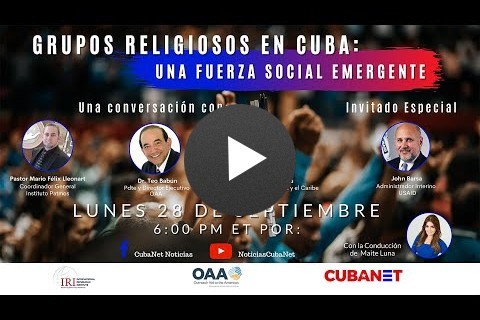Speeches Shim
[As Prepared]
Español
Palabras de Apertura
Gracias, Maite, por darme la bienvenida hoy. Es un placer estar con todos ustedes y hablar sobre un tema tan importante.
La libertad religiosa y la fe son elementos centrales de la sociedad. Las comunidades religiosas son el pegamento que mantiene unidas a las sociedades, especialmente en América Latina y el Caribe.
Las comunidades religiosas tienen la capacidad única de descubrir la opresión que ocurre detrás del velo de la tiranía.
Díaz-Canel sabe que la comunidad internacional escucha cuando grupos religiosos muy respetados informan sobre lo que está sucediendo en Cuba.
Si bien la comunidad religiosa es fundamental para elevar los temas de derechos humanos, también debemos reconocer el papel clave que desempeñan en prestar asistencia a quienes más lo necesitan.
En Cuba, los grupos religiosos han brindado una asistencia sin precedentes en los últimos años. Están preparando comidas para los adultos mayores y dando clases particulares a los niños pequeños.
Cuando un tornado mortal afectó a Cuba en enero del año pasado, las iglesias respondieron de inmediato. Los congregantes se apresuraron a llenar bolsas con ropa y comida para las víctimas.
La libertad religiosa es un tema personal para mí. Como cubanoamericano, crecí en Miami rodeado de refugiados cubanos de primera y segunda generación.
Mi madre, una católica practicante, se vio obligada a huir de Cuba cuando la revolución comunista de Castro comenzó a propagarse por todo el país.
Asistí a una escuela secundaria jesuita en Miami. Esta escuela se vio obligada a mudarse completamente de Cuba a Miami debido a la persecución.
Así que comprendo de primera mano cómo la discriminación basada en la fe puede sembrar el caos, destruir vidas, desarraigar sociedades y dividir familias.
Esto es lo que me trae a nuestra discusión de hoy. Estamos aquí hoy para celebrar la fe como un vínculo común entre las personas y un motor para mejorar vidas.
Gracias por permitirme unirme a ustedes hoy. Aprecio todo el trabajo que hacen y estoy emocionado por hablar con nuestros invitados.
Palabras de Clausura
En la actualidad, demasiadas personas viven en países donde la libertad de conciencia es amenazada, restringida o negada rotundamente.
Cuando los gobiernos suprimen la libertad de religión, impiden que segmentos enteros de la sociedad realicen contribuciones significativas al desarrollo político, social y económico de su país.
Esta noción contradice totalmente el objetivo de USAID de fomentar sociedades inclusivas. Los países simplemente no pueden alcanzar su máximo potencial sin abrazar el pluralismo que es fundamental para el tapiz de tantas sociedades en la actualidad.
Gracias nuevamente por el honor de unirme a ustedes hoy.
English
Opening Remarks
Thank you, Maite, for welcoming me today. It’s a pleasure to join you all and to speak about such an important topic.
Religious freedom and faith are core elements of society. Faith communities are the glue that keep diverse populations together, particularly in Latin America and the Caribbean.
Faith-based communities are uniquely positioned to uncover and shed light upon oppression happening behind the veil of tyranny.
Diaz-Canel knows that when well-respected religious groups report what is happening in Cuba, the international community listens.
What’s more, while the faith-based community is critical to elevating human rights issues, we must also recognize the key role they play in providing assistance to people in need.
In Cuba, faith-based groups have delivered unprecedented assistance in recent years. They are cooking meals for the elderly and tutoring young children.
When a deadly tornado ripped through Cuba in January last year, churches responded immediately. Congregants rushed to fill bags with clothes and food for tornado victims.
Religious freedom is a personal issue for me. As a Cuban American, I grew up in Miami surrounded by first- and second-generation Cuban refugees.
My mother, a practicing Catholic, was forced to flee Cuba as Castro’s communist revolution began to cascade throughout the country.
I attended a Jesuit high school in Miami. This school was forced to entirely move out of Cuba to Miami because of persecution. So I understand first-hand how discrimination on the basis of faith can sow chaos, destroy lives, uproot societies, and divide families.
On June 2, President Trump signed an Executive Order on Advancing International Religious Freedom. This executive order makes clear that advancing religious freedom is a major U.S. foreign policy and national security priority—not just with rhetoric, but with resources.
This is what brings me to our discussion today. We’re here today to celebrate faith as a common bond between people and a foundation for improving human lives.
Thank you for allowing me to join you today. I appreciate all the work you do, and I look forward to speaking with our guests.
Closing Remarks
Today, too many people live in countries where freedom of conscience is threatened, restricted, or flat-out denied.
When governments suppress freedom of religion, they prevent entire segments of society from making meaningful contributions to their country’s political, social, and economic development. Their populations suffer for this loss.
This suppression is in complete contradiction to USAID’s goal of fostering inclusive societies. Countries simply cannot reach their full potential without embracing the pluralism that is fundamental to the tapestry of so many societies today.
Thank you again for the honor of joining you all today.


Comment
Make a general inquiry or suggest an improvement.